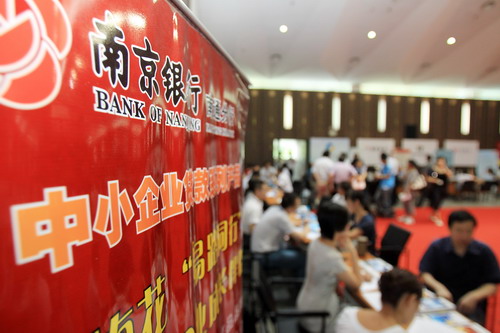Lenders will issue bonds to aid SMEs
Updated: 2011-10-26 11:15
By Lan Lan and Li Wenfang (China Daily)
|
|||||||||||
|
 Bank of Nanjing promotes its financial service for SMEs during a forum. Preparatory work to allow commercial banks to issue bonds to fund small enterprises is under way. [Photo/ China Daily] |
BEIJING / GUANGZHOU - China will encourage commercial banks to issue bonds to provide loans for small businesses, as part of the government's latest efforts to solve their cash-flow problems.
Approval work for bond issuance is under way, said Xiao Yuanqi, a director of financial services for small businesses at the China Banking Regulatory Commission (CBRC), on Tuesday.
"Commercial banks must make sure that all the money collected through bond sales is used exclusively for loans to small enterprises," said Xiao.
The CBRC won't set a limit on the value of the bonds, but Xiao said banks have shown a great eagerness to issue them, he said.
"It's definitely good news for enterprises," said Guo Tianyong, an economics professor at the Central University of Finance and Economics in Beijing.
Meanwhile, banks will also take further measures to support small enterprises. For example, qualified commercial banks are being encouraged to expand their operations and set up local branches and franchised agencies to serve small enterprises nationwide, Xiao said.
Banks should increase their tolerance of non-performing loan (NPL) ratios for small enterprises, but there will not be a specific range for the ratio as different banks have different conditions, he said.
Commercial banks will not be allowed to charge small businesses extra fees for services such as consulting, when providing them with loans.
This year, outstanding loans to small enterprises had hit 9.85 trillion yuan ($1.55 trillion) by the end of July, an increase of 26.6 percent compared with the same period last year, according to the CBRC.
Meanwhile, the growth of outstanding loans was approximately 10 percentage points higher than the banks' total outstanding loans by the end of July.
However, under the tight credit conditions that came into force earlier this year, small and medium-sized enterprises (SMEs) have been faced with a shortage of cash.
That resulted in a number of factory owners in Wenzhou, Zhejiang province, fleeing, leaving their workers high and dry, after they failed to secure enough funds to stay afloat.
Premier Wen Jiabao urged stronger financial support for China's small businesses during his recent visit to Zhejiang province, an area often seen as a barometer of China's economic health.
Banks should make credit support for small enterprises a priority and set targets for the proportion and growth of loans to small companies, Wen said.
Small enterprises across the country are facing a lack of capital, especially in coastal provinces such as Guangdong.
According to a recent survey, nearly 80 percent of SMEs in Guangdong reported a shortage of working capital and 33.4 percent of them experienced a shortfall of more than 10 percent.
Those financial difficulties are being exacerbated by a host of other factors, such as currency appreciation, tight land supply and labor shortage.
The yuan's appreciation against the US dollar this year has pushed up export costs, according to Lu Depei, an official with the Economic and Information Commission of Guangdong, on Tuesday.
The cost of labor has surged by more than 20 percent, because of increases in the minimum wage, pensions and medical insurance payments, Lu said.
The high prices of raw materials, including copper and crude oil, have also added greater pressure on labor-intensive businesses.
Guangdong is expected to face greater pressure in the rest of the year, as the continuing weakness of the US and European markets will result in a decline in exports.
Related Stories
Financial system needs to serve SMEs 2011-10-25 10:44
Cash-strapped SMEs see dawn break 2011-10-17 13:08
Forum helps SMEs in Weifang 2011-10-01 15:37
Alarm over China's SMEs 2011-09-30 13:36
- Micro credit providing a lifeline
- Sinopec lifts diesel output to ease severe shortages
- Chinese satisfied with nation's banks: Poll
- Illegal land use gives year-end GDP boost
- Farmers, Nestle in milk payment row
- 'Inflation remains a top priority'
- Scandal-hit Wal-Mart stores reopen
- Pacific Department Store exits Beijing










